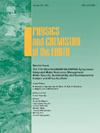应用纳米材料去除多孔沥青中的污染物
IF 3
3区 地球科学
Q2 GEOSCIENCES, MULTIDISCIPLINARY
引用次数: 0
摘要
本研究旨在通过实验和数值分析纳米材料对城市地表径流中多孔沥青的污染物去除效果。为此,应用了 19 种样品,包括二氧化钛(TiO2)、氧化石墨烯(GO)、氧化锌(ZnO)和氧化铜(CuO),以减少地表径流中的污染。利用 COMSOL 软件中的实验室数据模拟了数值模型,并将这些方法的结果与实验室结果进行了比较。数值结果和实验结果表明,在多孔沥青中添加 ZnO 和 GO 对减少污染水流中的硫酸盐(SO₄)、硝酸盐(NO3)、总悬浮固体(TSS)和总溶解固体(TDS)参数有积极作用,而添加 CuO 和 TiO2 则有消极作用,但两者略有不同。此外,研究结果表明,在多孔沥青中添加浓度为 6% 和 8% 的纳米微粒 (NPs) 有益,而添加浓度为 2% 的纳米微粒对降低污染水流中溶解的铅(Pb)参数没有影响。总之,研究结果表明,含氧化锌的沥青样品在吸收和降低污染水中溶解的所有污染物参数方面都有积极作用。而含 CuO 的沥青样品则产生了相反的结果,或者对各种参数几乎没有影响,反而增加了流出水中的污染物数量。此外,含有 GO 和 TiO2 的沥青样品也对降低某些污染参数起到了积极作用。本文章由计算机程序翻译,如有差异,请以英文原文为准。
Application of some nanomaterials on pollutant removal in the porous asphalt
This research has been aimed to experimentally and numerically examine the effect of nanomaterials on pollutant removal in the porous asphalt in urban surface runoff. For this purpose, 19 samples including Titanium dioxide (TiO2), Graphene Oxide (GO), Zinc Oxide (ZnO), and Copper Oxide (CuO) were applied to reduce pollution in surface runoff. Numerical models were simulated using laboratory data in COMSOL software, and the results of these methods were compared with the laboratory results. With a slight difference, the numerical and experimental results indicated the positive effect of adding ZnO and GO and the negative effect of adding CuO and TiO2 to the porous asphalt in reducing the Sulfate (SO₄), Nitrate (NO3), Total Suspended Solids (TSS), and Total Dissolved Solids (TDS) parameters in the polluted water outflow. Also, obtained results showed adding these Nano Particles (NPs) to the porous asphalt at concentrations of 6% and 8% had a beneficial effect and that adding NPs at concentrations of 2% had no effect in reducing the Lead (Pb) parameter dissolved in the polluted water outflow. Overall, the results indicated the positive effect of the ZnO-containing asphalt sample in absorbing and reducing all parameters of pollutants dissolved in the polluted water. The CuO-containing asphalt sample was also discovered to have produced opposite results or have nearly no effect on various parameters, increasing the amounts of pollutants in water outflow. In addition, the asphalt samples containing GO and TiO2 also positively contributed to reducing certain pollution parameters.
求助全文
通过发布文献求助,成功后即可免费获取论文全文。
去求助
来源期刊

Physics and Chemistry of the Earth
地学-地球科学综合
CiteScore
5.40
自引率
2.70%
发文量
176
审稿时长
31.6 weeks
期刊介绍:
Physics and Chemistry of the Earth is an international interdisciplinary journal for the rapid publication of collections of refereed communications in separate thematic issues, either stemming from scientific meetings, or, especially compiled for the occasion. There is no restriction on the length of articles published in the journal. Physics and Chemistry of the Earth incorporates the separate Parts A, B and C which existed until the end of 2001.
Please note: the Editors are unable to consider submissions that are not invited or linked to a thematic issue. Please do not submit unsolicited papers.
The journal covers the following subject areas:
-Solid Earth and Geodesy:
(geology, geochemistry, tectonophysics, seismology, volcanology, palaeomagnetism and rock magnetism, electromagnetism and potential fields, marine and environmental geosciences as well as geodesy).
-Hydrology, Oceans and Atmosphere:
(hydrology and water resources research, engineering and management, oceanography and oceanic chemistry, shelf, sea, lake and river sciences, meteorology and atmospheric sciences incl. chemistry as well as climatology and glaciology).
-Solar-Terrestrial and Planetary Science:
(solar, heliospheric and solar-planetary sciences, geology, geophysics and atmospheric sciences of planets, satellites and small bodies as well as cosmochemistry and exobiology).
 求助内容:
求助内容: 应助结果提醒方式:
应助结果提醒方式:


